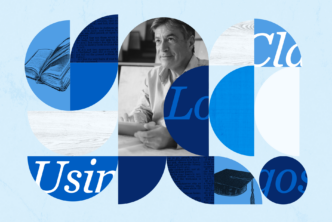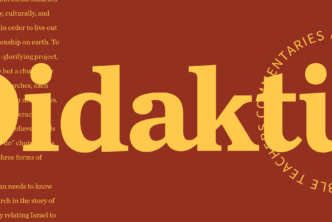A Beneficial Mentoring Relationship Requires Intentionality
Daniel Scott and Taylor Reimer | Tyndale University College and Seminary
‘‘Not the least shyness, now, Telemakhos,” says the original Mentor in The Odyssey.1 He appears as an old trusted friend of Odysseus, and as his guide is the personification of wisdom.
Many of us were forced to read the story of Telemakhos in our first years at university, perhaps, by a different type of mentor—the professor. A classic text, foundational to the study of Western civilization and read by countless undergraduates over the years, The Odyssey details a hero’s journey and a coming-of-age story. There is something relatable about the character of Telemakhos, especially for those young minds about to embark on the journey to and beyond graduation.
Like Telemakhos, students need mentors. And professors, as mentors, need to be intentional — with “not the least shyness.”
Why is it that those of us who have what Carl Jung tells us mentors represent—“knowledge, reflection, insight, wisdom cleverness, and intuition”—are often reluctant to serve as mentors?2 For many of us, the reason is simple: we are shy. And, often, even without our knowing it, students mimic us and model themselves after us. They sense our fear.
Yet we need to be intentional in establishing mentoring relationships with our students. In the decades since Gail Sheehy popularized the term “mentor” in her bestselling book Passages, success (whether in business3 or academia4) is a great deal more likely with a mentor.5 Sheehy describes her own mentoring relationship with cultural anthropologist Margaret Mead as one of the things that inspired her to write her book.
Intentional mentoring recognizes that we all are not alike in how we mentor
Don’t be shy about being your type of mentor. It’s your motive that counts, not the method or formula you use to mentor.
Some professors are very good at meeting students for discipleship. They host Bible studies in their offices and have signup sheets on their office door for one-on-one meetings.
Others are very good at providing the important mentoring role of sponsorship, much like the relationship between Moses and Joshua (Exod 24:13; Num 11:28; 27:15ff.) or Elijah and Elisha (1 Kgs 19:19ff.; 2 Kgs 2:2–13), and to a lesser degree Jeremiah and Baruch (Jer 43:3). These mentors suggest applying to graduate programs or scholarship opportunities, write letters of recommendation, and invite students to tag along with them to academic conferences.6
Or perhaps, as Karen L. Webber, Thomas F. Nelson Laird, and Allison M. BrckaLorenz note, these mentors allow their students to take part in their research.7 Participating in undergraduate research projects is a form of being mentored. Not only does it open the door for more personal conversations between faculty and students; it also fosters a sense of academic prowess in students. As Joyce Kinkead and Laurie Grobman explain, many students succeed when given the opportunity to participate in undergraduate research, especially those who may have previously struggled academically.8 Not the least shyness in these scholars!
Many mentors are just really good guides. There are numerous examples of guides or counselors in Scripture: Moses’ father-in-law (Exod 18:19); Balaam (Num 24:14); Ahithophel (2 Sam 15:12); Nathan the prophet (1 Kgs 1:11); Deborah (Judg 5); the wise woman of Abel (2 Sam 20:14–23); and the wicked queen mother of Ahaziah (2 Chr 22:3).9
All students benefit from mentoring
Don’t be shy in approaching students; don’t wait for them to come to you. Some students are assertive in asking faculty members to serve as their mentor, but many students will not take the initiative. Sometimes the quieter, more reticent students are the best mentees. They’re delighted to receive advice or pointers and are just too scared to ask.
It is not just students who need mentors; so, too, do junior faculty
Don’t be shy in helping your colleagues navigate the rough waters of the academic workplace.
As Joselynn Fountain and Kathryn E. Newcomer explain, much of the mentoring that takes place between faculty members happens informally,10 meaning that professors need to be intentional in starting mentee relationships. There is a real need for peer mentoring to help with such things as classroom management, promotion and tenure, and the balance between teaching and scholarship. Nancy W. Collins explains the need for a mentor and gives advice to those who would like to be a mentor or have a mentor.11 There is no need to limit this mentoring to within your own educational institution; seek faculty mentors or mentees at other schools, as well. This kind of outreach is great for networking, and it takes away the awkwardness of office politics.
Most of us can think of a time in our undergraduate career where we benefitted from the sage advice of mentors. They opened doors for us, pushed us academically, and, most importantly, came alongside us as friends. Our mentors may have felt awkward and far removed from our struggles, or perhaps they had all the right intentions but all the wrong words. Nevertheless, their lack of shyness helped us! As faculty, we owe it to our current students to put aside our own shyness and mentor the next generation.
DANIEL SCOTT is associate professor at Tyndale University College and Seminary in Toronto and teaching elder at St. John’s Presbyterian Church in Bradford West Gwillimbury, Ontario.
TAYLOR REIMER launched a confirmation mentoring program at St. Clement’s Church, Toronto, where she serves as youth minister. Throughout her undergraduate studies, she received mentoring from various faculty at Tyndale University College.
This article first appeared in Didaktikos: The Journal of Theological Education. Theological faculty in the United States and Canada can receive Didaktikos by mail for free. Theological faculty in other countries can read Didaktikos online. Sign up today.

- Homer, Od. 3.16 (Fitzgerald).
- For a fuller discussion of mentoring from Homer to Jung, see L. A. Daloz, Effective Teaching and Mentoring (San Francisco: Jossey-Bass, 1986), 16–42.
- E. C. G. Collins and P. Scott, eds., “Everyone Who Makes It Has a Mentor,” Harvard Business Review 56.4 (1978): 89–101; E. C. Shapiro, F. P. Haseltine, and M. P. Rose, “Moving Up: Role Models, Mentors, and the Patron System,” Sloan Management Review (Spring 1978): 51–58.
- K. M. Moore, “The Role of Mentors in Developing Leaders for Academe,” Education Record 63.1 (1982): 23–28.
- Gail Sheehy, Passages (Toronto: Bantam, 1976).
- An important book dealing with how faculty members, student affairs educators, and administrators serve as mentors who help undergraduate students develop is Robert D. Brown and David A. Decistere, eds., Mentoring-Transcript Systems for Promoting Student Growth (San Francisco: Jossey-Bass, 1982).
- See Karen L. Webber, Thomas F. Nelson Laird, and Allison M. BrckaLorenz, “Student and Faculty Member Engagement in Undergraduate Research,” Research in Higher Education 54.2 (2013): 227.
- Joyce Kinkead and Laurie Grobman, “Expanding Opportunities for Undergraduate Research in English Studies,” Profession (2011): 218–30.
- See P. A. H. DeBoer, “The Counsellor,” in Wisdom in Israel and the Ancient Near East, ed. M. Noth and D. Winton Thomas (Leiden: Brill, 1969), 42–71.
- See Joselynn Fountain and Kathryn E. Newcomer, “Developing and Sustaining Effective Faculty Mentoring Programs,” Journal of Public Affairs Education 22.4 (2016): 483–506.
- 11 Nancy W. Collins, Professional Women and Their Mentors (Englewood Cliffs, NJ: Prentice-Hall, 1983).





